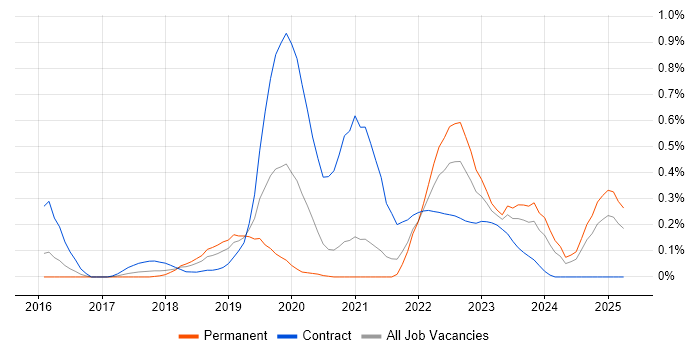IBM UrbanCode
South West > Bristol
The table below provides summary statistics for permanent job vacancies advertised in Bristol requiring IBM UrbanCode skills. It includes a benchmarking guide to the annual salaries offered in vacancies that cited IBM UrbanCode over the 6 months leading up to 5 May 2025, comparing them to the same period in the previous two years.
| 6 months to 5 May 2025 |
Same period 2024 | Same period 2023 | |
|---|---|---|---|
| Rank | 97 | 152 | 165 |
| Rank change year-on-year | +55 | +13 | +25 |
| Permanent jobs citing IBM UrbanCode | 6 | 5 | 7 |
| As % of all permanent jobs advertised in Bristol | 0.48% | 0.16% | 0.26% |
| As % of the Development Applications category | 2.96% | 1.18% | 1.68% |
| Number of salaries quoted | 5 | 5 | 3 |
| 10th Percentile | - | - | £63,254 |
| 25th Percentile | £70,097 | £75,219 | £71,884 |
| Median annual salary (50th Percentile) | £71,991 | £83,577 | £101,752 |
| Median % change year-on-year | -13.86% | -17.86% | +0.65% |
| 75th Percentile | £73,886 | £91,934 | £117,236 |
| 90th Percentile | £85,821 | £94,697 | - |
| South West median annual salary | £71,991 | £83,577 | £101,752 |
| % change year-on-year | -13.86% | -17.86% | +0.65% |
All Development Application Skills
Bristol
IBM UrbanCode falls under the Development Applications category. For comparison with the information above, the following table provides summary statistics for all permanent job vacancies requiring development application skills in Bristol.
| Permanent vacancies with a requirement for development application skills | 203 | 424 | 416 |
| As % of all permanent jobs advertised in Bristol | 16.15% | 13.69% | 15.68% |
| Number of salaries quoted | 146 | 344 | 261 |
| 10th Percentile | £38,750 | £40,000 | £37,885 |
| 25th Percentile | £45,250 | £47,500 | £47,500 |
| Median annual salary (50th Percentile) | £60,000 | £59,526 | £60,000 |
| Median % change year-on-year | +0.80% | -0.79% | +12.97% |
| 75th Percentile | £76,250 | £75,000 | £76,250 |
| 90th Percentile | £93,778 | £87,500 | £90,000 |
| South West median annual salary | £57,443 | £55,000 | £55,000 |
| % change year-on-year | +4.44% | - | +10.00% |
IBM UrbanCode
Job Vacancy Trend in Bristol
Job postings citing IBM UrbanCode as a proportion of all IT jobs advertised in Bristol.

IBM UrbanCode
Salary Trend in Bristol
3-month moving average salary quoted in jobs citing IBM UrbanCode in Bristol.
IBM UrbanCode
Salary Histogram in Bristol
Salary distribution for jobs citing IBM UrbanCode in Bristol over the 6 months to 5 May 2025.
IBM UrbanCode
Co-occurring Skills and Capabilities in Bristol by Category
The follow tables expand on the table above by listing co-occurrences grouped by category. The same employment type, locality and period is covered with up to 20 co-occurrences shown in each of the following categories:
